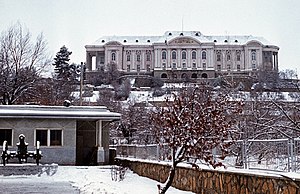Operation Storm-333: Difference between revisions
Undid revision 509865806 by Mujhideen101 (talk) |
Mujhideen101 (talk | contribs) mNo edit summary |
||
| Line 28: | Line 28: | ||
| strength2 = 2,500 |
| strength2 = 2,500 |
||
| strength3 = |
| strength3 = |
||
| casualties1 = |
| casualties1 = 100+ killed<br>~50 wounded |
||
| casualties2 = 200 killed<br> 1,700 captured<br>~200 wounded |
| casualties2 = 200 killed<br> 1,700 captured<br>~200 wounded |
||
| casualties3 = |
| casualties3 = |
||
Revision as of 03:05, 30 August 2012
| Operation Storm-333 | |||||||
|---|---|---|---|---|---|---|---|
| Part of The Soviet war in Afghanistan | |||||||
 The Tajbeg Palace in 1987. Photo by Mikhail Evstafiev | |||||||
| |||||||
| Belligerents | |||||||
|
|
| ||||||
| Commanders and leaders | |||||||
|
|
| ||||||
| Units involved | |||||||
|
Alpha Group Vympel Group Zenith Group Muslim Battalion VDV Air Troops |
Army National Guards Presidential Guard | ||||||
| Strength | |||||||
|
30 from Alpha 30 from Zenith 520 from Spetsnaz GRU ("Muslim Battalion") 80 paratroopers Total: 660 | 2,500 | ||||||
| Casualties and losses | |||||||
|
100+ killed ~50 wounded |
200 killed 1,700 captured ~200 wounded | ||||||
Operation Storm-333 («Шторм-333») was the codename of the Soviet special forces operation on 27 December 1979 in which Soviet special forces stormed the Tajbeg Palace in Afghanistan and killed President Hafizullah Amin and his 200 personal guards. His eleven year old son died due to shrapnel wounds.[1]
Several other government buildings were seized during the operation, including the Ministry of Interior building, the Internal Security (KHAD) building, and the General Staff building (Darul Aman Palace). Alpha Group's veterans call this operation one of the most successful in the group's history.
Soviet forces and losses
Taking part in the operation were 24 men from «Гром» ("Thunder") unit of Alpha Group, GRU, and 30 operators from a special KGB group: «Зенит» ("Zenith"). There were also 520 men from the 154th Separate Spetsnaz Detachment of the USSR Ministry of Defence, known as the "Muslim battalion" because it consisted exclusively of soldiers from the southern republics of the USSR, and 87 troops of a company of 345 Guards Airborne Regiment [2]. These support troops were not issued armor or helmets, but one of them recalls that a magazine tucked inside his clothes protected him from an SMG bullet. The GRU and KGB units were clad in bullet-proof vests and helmets; this proved crucial, because Amin's personal guards were armed only with submachine guns, which were not able to penetrate the Soviet vests.
In the operation, Alpha Group lost 2 men, Zenith group lost 3, the Muslim battalion 9, and the Air Landing company 5. More than 50 were wounded in total.[3]
Controversy about Soviet losses
According to Mitrokhin Archive, "over a hundred of the KGB troops were killed before the palace was taken and Amin gunned down".[4] Although co-writer Christopher Andrew does concede that the higher figure may have consisted of all "casualties" and not just deaths[citation needed]. However, it is stated in publication "The KGB in Afghanistan" by Vasili Mitrokhin [5]
«Over 700 members of the KGB from the Center and the Periphery were dropped into Kabul to take part in "Operation Agat." The troops were dressed in Afghan army uniforms. ... Over 100 of the KGB were killed in the attack on the palace. Such large losses forced Andropov to question the expediency of hanging portraits in mourning frames of heroes killed whilst carrying out their noble international mission in the halls and corridors as this would attract unnecessary attention.»
Notes
- ^ http://specialops.yolasite.com/operation-storm-333.php
- ^ Template:Ru icon Article on Storm-333 at VPK-news.ru
- ^ Template:Ru icon Baikal-79 by A. Lyakhovskiy
- ^ The Sword and the Shield, Basic Books 1999, ISBN 0-465-00310-9, pp 390-391
- ^ Cold War International History Project, Woodrow Wilson International Center for Scholars. Working paper №40
References
- Braithwaite, Rodric, "Afgantsy The Russians in Afghanistan 1979-89", Profile Books, 2011. ISBN 978-1-84668-062-5.
- Mitrokhin, Vasiliy (July 2002). "The KGB in Afghanistan" (PDF). Woodrow Wilson International Center for Scholars. Retrieved 2011-12-16.
{{cite web}}: Cite has empty unknown parameter:|coauthors=(help) - Lyakhovskiy, Aleksandr (January 2007). "Inside the Soviet invasion of Afghanistan and the Seizure of Kabul, December 1979" (PDF). Woodrow Wilson International Center for Scholars. Retrieved 2007-09-25.
{{cite web}}: Cite has empty unknown parameter:|coauthors=(help) - Grau, Lester. "The Take-Down of Kabul: An Effective Coup de Main". GlobalSecurity.org. Retrieved 2007-09-25.
{{cite web}}: Cite has empty unknown parameter:|coauthors=(help)
